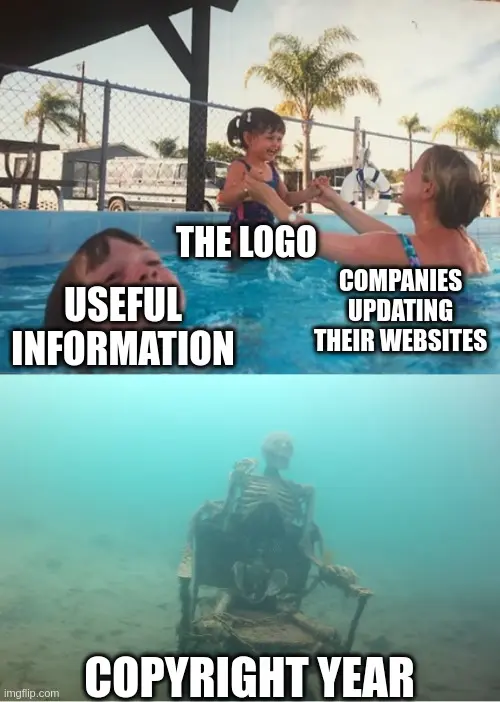document.querySelector('span#copyright_year').innerText = new Date().getFullYear()
Programmer Humor
Post funny things about programming here! (Or just rant about your favourite programming language.)
Rules:
- Posts must be relevant to programming, programmers, or computer science.
- No NSFW content.
- Jokes must be in good taste. No hate speech, bigotry, etc.
No need to specify the tag name in the selector if you’re going to use an ID anyway.
Right - it should have been:
document.querySelectorAll('span#copyright_year').forEach((el) => { el.innerText = new Date().getFullYear() })
so that we update all spans with that ID!
So true and yet so hurtful.
<span>© <?php echo date("Y"); echo $companyName ?></span>
My understanding is you don't actually need to update the copyright year.. if anything it's kinda misleading if you only have the current year
Not that a date in a file really is valid evidence, but the point is to define when the copyright occurs. If i come back and say "well i did that same thing before you did" them it would make your copyright invalid.
If you update then you add an additional date.
You don't. It's the year it was copywrited, not the current year.
I'm not any type of lawyer, especially not a copyright lawyer, though I've been informed that the point of having the copyright date is to mark when the work (book, website, photo, etc) was produced and when last edited. Both aspects are important, since the original date is when the copyright clock starts counting, and having it further in the past is useful to prove infringement that occurs later.
Likewise, each update to the work imbues a new copyright on just the updated parts, which starts its own clock, and is again useful to prosecute infringement.
As a result, updating the copyright date is not an exercise of writing today's year. But rather, it's adding years to a list, compressing as needed, but never removing any years. For example, if a work was created in 2012 and updated in 2013, 2015, 2016, 2017, and 2022, the copyright date could look like:
© 2012, 2013, 2015-2017, 2022
To be clear, I'm not terribly concerned with whether large, institutional copyright holders are able to effectively litigate their IP holdings. Rather, this is advice for small producers of works, like freelancers or folks hosting their own blog. In the age of AI, copyright abuse against small players is now rampant, and a copyright date that is always the current year is ammunition for an AI company's lawyer to argue that they didn't plagiarize your work, because your work has a date that came after when they trained their models.
Not that the copyright date is wholly dispositive, but it makes clear from the get-go when a work came unto copyright protection.
If a work is updated every year between 2020 and 2024 (2020,2021,2022,2023,2024) would it be valid to write 2020-2024?
If there were changes in 2020 to 2024 inclusive, then yes, I'd write it as 2020-2024. But if not inclusive, then I'd write 2021-2023.
Thank you.
There's some good info out there from the good people that know how things should work that created the reuse tool - https://reuse.software/ - and basically the conclusion is that nobody should be updating the years on the copyright line just because it's a new year. The only useful info and what should be done is put the year when the file is created and that's it.
Edit: took me a while to find the proper thing I wanted to link - https://matija.suklje.name/how-and-why-to-properly-write-copyright-statements-in-your-code
Had to go first to the recent curl blog where the author wants to go the weird way of not having useful info at all on the files.
Thank you for those two links!! I don’t necessarily have the time right now, but from first glance, those seem super interesting!
The one thing that consistently gets caught in code reviews in my shop is a failure to update a copyright date. I have been tempted to submit clearly crap code just to see if anyone actually is paying attention.
Unless you're renewing your copywrite every year, changing the date every year is wrong. You list the date it was copywrited, not the current year.
We add the current year to the copyright dates, the current updates are protected from the time of authorship. So if the copyright says, 2012, 2014, 2022; I would add a 2024. The commit records can be used to determine what was changed each instance, but the update provides notice of when changes were made.
Discerning what is protectable creative expression versus functional and therfore unprotected is an issue for the courts.
